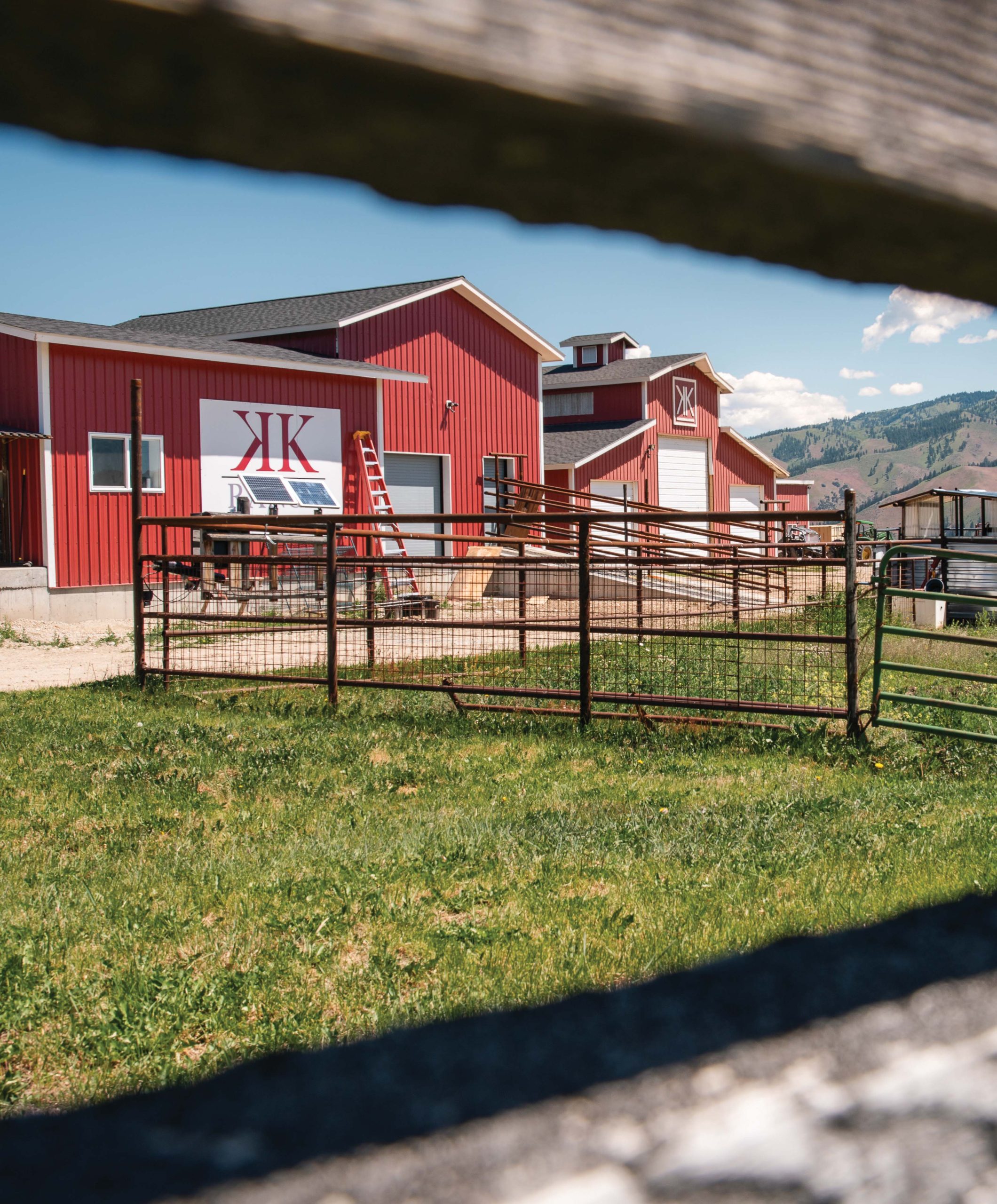
25 Sep Happy Animals, Healthy Land
On a sunny afternoon in late May, Dillon Kouf stands at the heart of Double K, his family’s ranch outside Darby, Montana, surrounded by barns and outbuildings and the vibrant green of spring. Around him, the endless bustle of chores continues: a couple of men are welding a new cattle chute; working dogs cruise by for a quick scratch on the head as they follow a four-wheeler out of the yard; and projects are underway everywhere, from new fencing to a new concrete floor in the barn to the repair of a small shed, blown over in a recent windstorm. In a nearby pasture, Angus cattle graze in the deep grass. Berkshire pigs, also known as Kurobuta, wander beneath trees. To the west, clouds catch on the peaks of the Bitterroot Range.
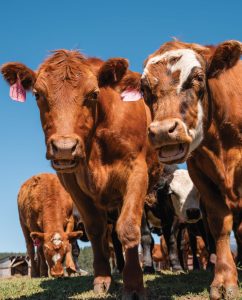
Owner Dillon Kouf prides himself on raising happy, healthy animals at his Double K Ranch outside of Darby, Montana.
Busy as he is, Kouf is happy to take a break and chat about all aspects of the operation, from Double K’s history on the land and the small storefront on the property to their recently expanded butcher shop, the charcuterie that they painstakingly make on site, and their wildly successful deli in Missoula. He humbly shares his thoughts on what sets them apart: “The two main things we want people to know about Double K are the way we raise the animals and that we are doing all the processing ourselves. There’s no middleman. People can go to the deli and get a burger and a pack of salami, and it was all raised, butchered, and processed right here on the ranch.”
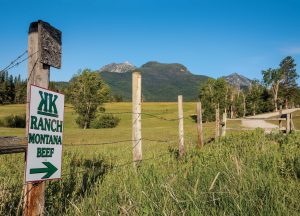
A sight for sore eyes, the Double K Ranch is nestled in the foothills of the Bitterroot Mountains.
On the face of it, this notion doesn’t sound terribly radical: Shouldn’t you be able to go and buy a cut of meat where that animal was raised? Historically, that would have been the case. Decades ago, livestock producers often raised, slaughtered, butchered, and sold their meat themselves, or at least the supply chain remained relatively local. But as the face of agriculture changed in response to national and global forces, it became increasingly difficult for ranchers and farmers to keep the entire process in house. Local processing facilities shuttered, long-haul shipping became cheaper, and suddenly, it made more sense to move animals and produce out of state than to sell them to a neighbor. Turns out that Double K is a rare breed indeed.
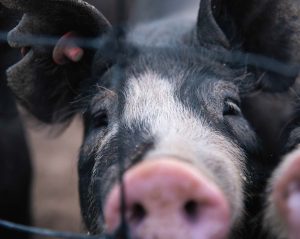
Berkshire pigs like this one are also known as Kurobuta.
“In the 1950s, 70 percent of the food that we were eating in Montana was grown in Montana. And that’s been on a very steep decline,” says Erin Austin, director of community partners with AERO (Alternative Energy Resources Organization) and the nonprofit’s program Abundant Montana, which supports and advocates for sustainable food systems within the state. “Just in the early 2000s, that number was down to 8 percent, and today we’re at 3 percent or less.”
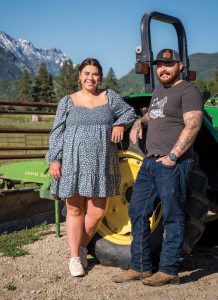
Partners Dillon and Tesalynn Kouf are the owners and operators of Double K Ranch.
This precipitous decline of local food is problematic for myriad environmental, economic, and socio-cultural reasons, as are many other aspects of industrial agriculture. But purveyors like Double K are pushing against the status quo and setting an example of what’s possible for other producers in the state.
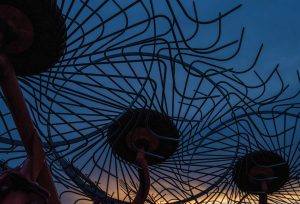
Strangely beautiful in relief against a twilight sky, this hay rake is an ordinary tool of the trade.
“Sustainability-wise, a lot of beef gets a bad rap because it’s often in feedlots, and there’s a hundred beef in small pens, they’re standing knee-deep in their own crap, and that’s no good,” says Kouf. “We want to always have happy, healthy animals that are always on pasture; they always have land to graze. We don’t want sad animals. So that’s the biggest thing for us. But the other part is because we’re able to do everything in house, we cut way down on emissions. There’s no transport. They’re not going from one ranch that’s birthing them, to a feedlot, then to a slaughterhouse, then to a butcher shop, which adds thousands of miles in between.”
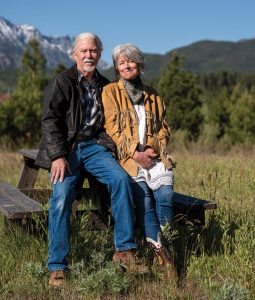
Jim and Lynn Kouf, the Double K’s founders, pose amid their bounty.
In every aspect of their operation, Double K chooses to do what’s best for the land, the environment, and their animals. More than 100 solar panels power the butcher shop and its several large freezers. An on-site composting facility turns the unusable remains of animals back into soil — though there isn’t much that winds up there. “We use absolutely every part of the animal that we can,” says Kouf. “We take all the offal that’s edible, and we grind it into dog food if we don’t sell it. We take all the fat from our pigs, and we render it and put it in the deep fryer in the deli.”
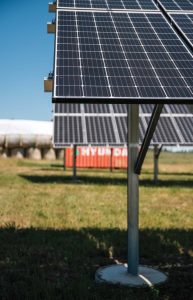
More than 100 solar panels power the butcher shop and its several freezers.
They practice rotational grazing, not just because it’s better for their animals, but it’s better for the land as well. “We have 800 acres and rotate them on about 600,” says Kouf. “Our goal is to have 300 beef total with the moms, babies, and bull. There are feedlots out there that have 100,000 beef on 800 acres.”
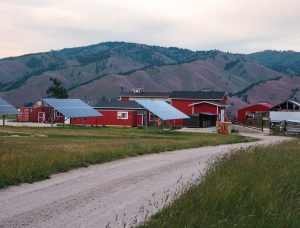
These cows spend their days munching fresh grass and soaking up vitamin D. “In the summertime, Triple Creek, the resort just down the road, sends their customers for cattle drives,” Kouf says, adding that the vacationers come twice a week to help move the cows to new grass. “If you do it right and put the right amount of beef on the land, it’s actually better for the ground. They fertilize it, and they kind of till it up a little bit.”
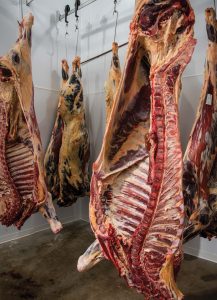
Double K’s Angus are one step closer to the table.
The result? Happier animals, healthier land.
“Farmers and ranchers know their land and walk their land and care for their land. It’s just a no-brainer. They can be some of the strongest advocates for conservation and environmental practices, especially in Montana,” says Austin, who partners with producers through her work with AERO. “Bigger picture? I think we’re seeing a lot of really groundbreaking, trendsetting practices here in the state. … People practicing stewardship agriculture in this way understand the relationship between soil-organism health, pollinator health, other insects on their properties, and how it all ties together. And that, then, is impacting the health of the crops or animals that they’re growing or raising, the end product, and ultimately the health of human consumers.”
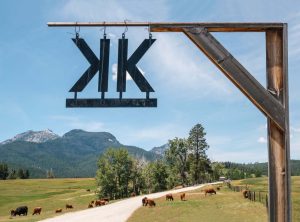
Rotated twice weekly over the ranch’s 600 acres, Double K’s cattle spend their days eating the plentiful fresh grass.
A conservation ethic — and a desire to foster healthy, aware, hard-working humans — is built into Double K’s DNA. Jim Kouf, Dillon’s father, grew up working on a family cattle ranch in northern California. The ranch was sold during his teens, but “I had such a great experience with it; I grew up knowing where the meat came from, and I knew that if I had kids, I wanted them to have that same experience,” recalls the elder Kouf. “I wanted them to know that meat comes from a ranch, from an animal, not from a store.” After searching throughout the West, he stumbled across 30 perfect acres in the Bitterroot Valley in 1985. It had a small cabin, backed up to U.S. Forest Service land, and would support cattle. “I started with four cows. Year after year after year, this has been a 40-year project.”
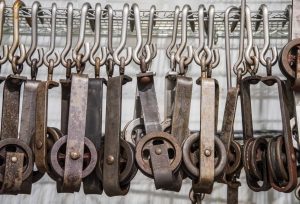
Meat trolleys like these can be found throughout the processing facility.
Through many iterations, the vision — and the ranch — grew. “As land in the area became available, we knew if we didn’t buy it, somebody was going to develop it. So it was initially bought to preserve — to protect it from development. And we said, ‘Well, we can’t just let the land do nothing,’ so we just kept building the herd up as we acquired more land.” The family spent the school year in California, where Jim worked as a screenwriter and the four Kouf children attended school but prioritized ranch time the rest of the year. Jim’s wife, Lynn, says, “We came up here the second school was out every summer, and for Thanksgiving, Christmas, spring break, and branding. And our four kids were raised very conscious about where their food came from. We’d drive back three or four times a year, loaded with coolers full of packets of steaks and hamburger from our cattle.”
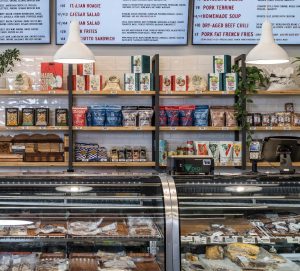
Double K’s brick-and-mortar storefront in Missoula offers a wide selection of their cured and butchered meats, along with a made-to order hot menu.
After Dillon finished college at Montana State University and spent a few years honing his culinary skills in restaurant kitchens, he decided he was ready to take over the ranch operation. But his vision was bigger than just raising and butchering animals; he knew there could be a market for finished products beyond just chops, steaks, and burger, and with their existing tools — ample land, a robust herd, a fully functioning butcher shop, and his culinary know-how — they could bring the highest-quality value-added products directly to the consumer. He and a chef friend threw themselves into the project with gusto.
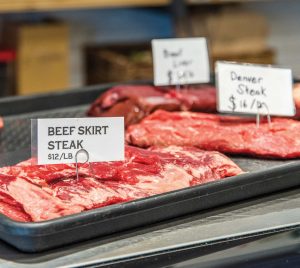
Choice cuts make their way straight from the Bitterroot Valley ranch to customers’ grills.
“I did a semester abroad in Italy, and everywhere you go, they have salamis. And I fell in love with that kind of lifestyle of meat, cheese, and wine, so I wanted to bring that back here,” says Dillon. After much experimentation and fine-tuning, the offerings are diverse and delicious: salami, of course, but also pastrami, smoked ham, prosciutto, pancetta, coppa, lomo, bresaola… the list goes on.
It’s little wonder, then, that when they finally opened a brick-and-mortar storefront in Missoula in 2022 — after selling out of a food truck and at farmers markets for several years — they already had a loyal following. Today, you can swing by the Double K deli and get a perfect smash burger for lunch — and bring home some freshly butchered chops and a pack of pastrami — and know that you’re supporting happy animals, healthy land, and a family who believes in doing agriculture the right way, for all the right reasons.
Melissa Mylchreest is a freelance writer and artist based in western Montana. When she’s not at her desk or in the studio, you can find her enjoying the state’s public lands and rivers with her two- and four-legged friends and family.
Nick VanHorn left the hustle and bustle of Fort Collins, Colorado after college in search of wide-open spaces. Since landing in Montana, VanHorn has worn a variety of hats, from ski patroller to bike mechanic to broadcast television professional. Whatever the task, VanHorn can be found with a camera in hand to document the journey.



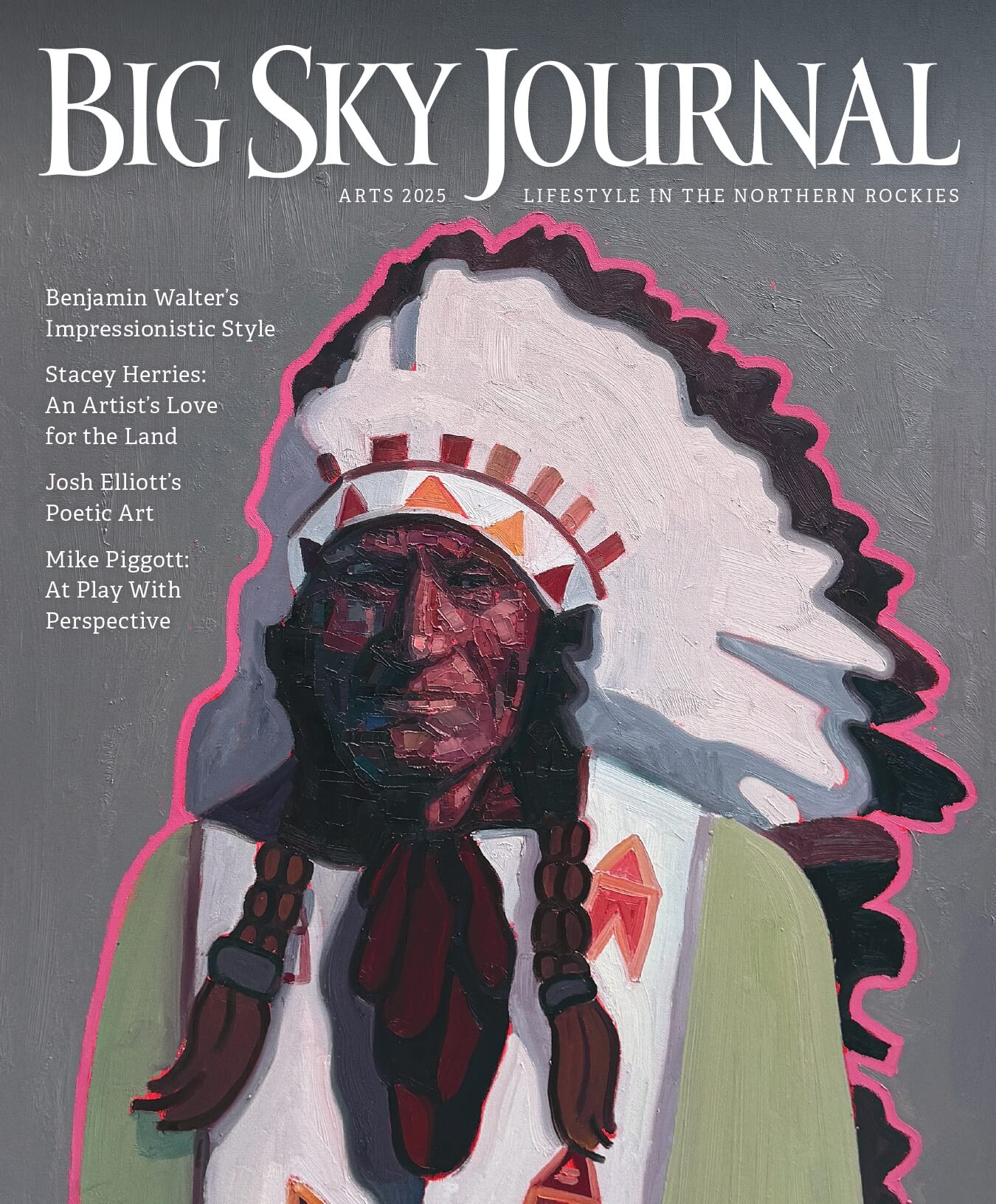
No Comments